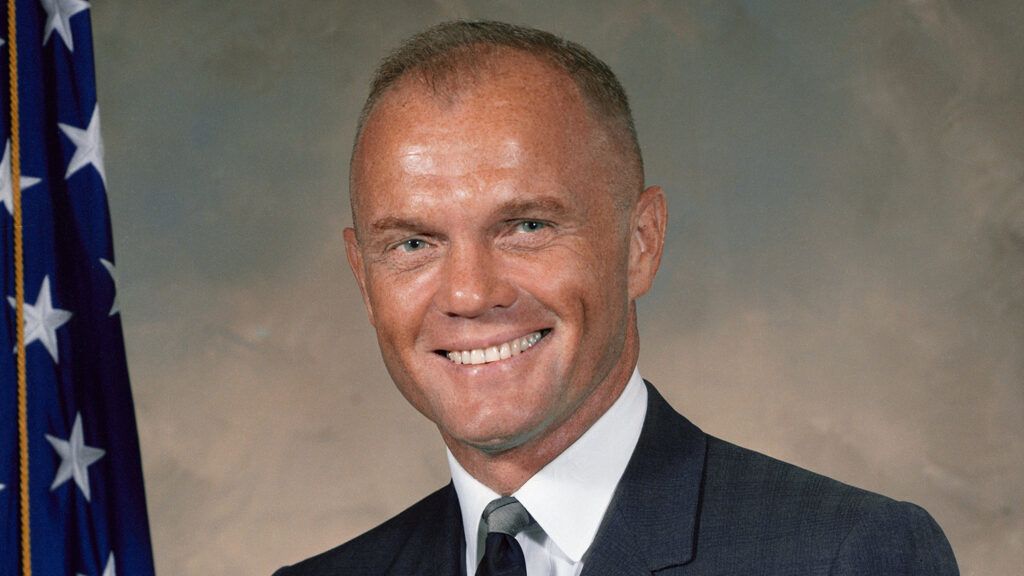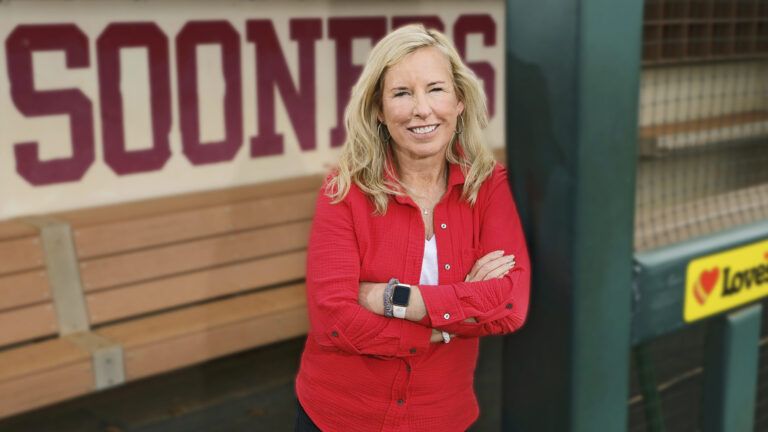Every mother knows that it isn’t parents alone who raise a child—it’s the whole community that surrounds him.
When our son completed America’s first manned orbit of Earth, his father and I came in for some of the general congratulations, just by dint of having raised him.
Proud? You bet, but more than this I think we were grateful. Grateful for our town of New Concord, Ohio. Because for us, and for John and Annie, New Concord is not just a place, it is a way of life.
READ MORE: BUZZ ALDRIN ON COMMUNION IN SPACE
It’s a family town. Fathers come home for lunch here. Children come home for fun and companionship. There are only 2,000 people in New Concord now, and when Johnny was growing up, there were even fewer, but these families put down deep roots; the youngsters playing in our yard today are the grandchildren of the friends we made when we moved here 39 years ago.
New Concord’s way of life is also a church way. There are four churches in town and things seem to revolve around Sunday worship and midweek prayer meeting. “Are we going to church Sunday?” is probably the least-asked question in New Concord.
I don’t mean that living here is a life without problems—only that trouble, when it does come, is somehow less defeating in these circumstances. We’ve had our share of grief like all families.
John was not our first child, as the papers had it, but our middle one; our first and third babies died and we adopted our daughter after we learned we could have no more children of our own. But just the fact that these things were known by everyone brought its own kind of comfort.
Certainly we’ve had financial troubles. Herschel (I’ve always called my husband by his middle name) chose New Concord to settle in because it looked like a good place to start a plumbing and heating service. He bought an old brown shingled house on Main Street for his store, and then he built on a showroom in front.
Then came the Depression. All new building stopped and the farmers put off modernizing their homes. Plumbing in those days was not the necessity it is today, anyway. I began to help out in the store by keeping the books, and at Johnny’s nap time I’d fold an old Army blanket at the bottom of our display bathtub and Johnny would go to sleep.
READ MORE: STORY MUSGRAVE ON SPIRITUALITY AND SPACE
In the evenings I did the washing and ironing and cleaning at home. It was exhausting, but working side by side with Herschel had wonderful rewards. There was a closeness that most people never get a chance to know.
I learned a lot too. I learned to recognize Herschel’s skill, and to know just why he was concerned over a rise in the price of copper tubing. One day an old farmer remarked to Herschel, “That gal in your office sure knows her pumps.” For me it was a real baccalaureate.
Of course, everyone in town was in the same boat during the depression, and there was a kind of brotherhood to hard times. Herschel and Homer Castor, town dentist and father of a little girl named Annie, who was already Johnny’s best friend, were talking one day. “People seem willing to do without bathtubs before everything else,” my husband remarked.
“No, Herschel,” said Homer, “they give up teeth first, then tubs.”
A small town can help you keep your sense of proportion in success as well as in failure. I was never more aware of this than the day John came home after that first orbital flight. He’d been greeted by the President, applauded by Congress, showered with ticker tape in New York. Now he stood up in the school gym in New Concord and looked around at the people he had known all his life.
“I know you teachers were pretty surprised to read about the straight A average some of the newspaper writers gave me,” he began. “And you coaches who let me warm quite a few benches now discover you played all your key moves through me.” He grinned at us. “Coming home can cut you down to size pretty fast.”
READ MORE: A-TO-Z WONDER FROM SPACE
Not that the town wasn’t proud of him. But it was real pride, I thought that day, not hero worship. While the rest of the country was trying to idolize John, New Concord remembered the little boy who earned money for a bicycle by selling rhubarb from my garden.
But in the midst of my gratitude for the kind of childhood John had, I am aware that this type of environment is increasingly rare. For more and more families, home is a city of strangers, or a growing suburb with a lot of people moving in and moving out. Even in New Concord, we feel the push of the future. The stable, small-town world is not the world in which most parents are raising their families today.
Why am I talking about it, then? Is it only to mourn over it, or is it possible that we can bring what is fine and wonderful about small-town life into life wherever we are?
I think that we can. I think so from watching Annie and John raise what are, in a grandmother’s eyes anyhow, two wonderfully balanced children, in surroundings that could not be more different from New Concord. On their 18th wedding anniversary, we figured up that John and Annie had moved 19 times. That’s up to 20 now since their move from Arlington, Virginia, to Houston, Texas, recently.
Yet Lyn and David do not seem like children who have never belonged anywhere, but are at home wherever they may be. I think the reason for this is clear to see. Annie and John like the small-town way of life, and they simply take it with them wherever they go.
Two things, after all, make up the essential life of New Concord: family and church. Now, it takes a little more doing to maintain a close-knit family when the father is not only away for lunch, but may be away for months on end.
Starting during World War II when they were married, through Korea, and the long periods of space flight training, John and Annie have known an endless series of separations. They bridge the gap through the simple device of knowledge: Annie cannot work side by side with John as I did with Herschel, but she and the children can know each day where John is, why he is there, exactly what he is doing.
We ourselves had a chance to see the system work when we spent Thanksgiving in Arlington last year, after John knew that he would be making the three-orbit trip. He unrolled a flight map on the dining room table and explained every detail of the flight.
After the flight, neighbors told us they’d paced the floor and wrung their hands in suspense. We hadn’t. With a map and a stop watch in front of us, we’d never been busier, never felt closer to John.
A father who is away a lot can find special ways, too, to let his family know they come first. A friend stopped by recently to tell us about a visit in Arlington. He’d gone to John’s house one evening to see him about an important matter.
John himself had just got back from a trip and told the friend that he would be with him shortly. First, he had promised Lyn help with her schoolwork and then David needed a hand with a model kit.
Our friend told us, “I didn’t mind the wait and it was good to see a father who puts first things first.”
As for church, this, too, takes a little more effort in a complex society where Sunday morning worship is not the automatic habit. But its values, too, are all the more evident. John and Annie look for a church in any new home almost before they’ve unpacked their bags. Annie plays the organ, which makes her a doubly welcome member at any church.
When there has been no church where John is stationed, they’ve sought out like-minded people and started one. The church they helped found in Patuxent, Maryland, held services in a theater, while Annie, John and the others threw themselves into a fund-raising campaign so they could build a real church. They built one, too, but John had been transferred by then.
People often ask them how they can spend so much time and effort in a given church when they know they’ll soon be leaving. But here, of course, is the very heart of the secret: They may leave a town, but they never leave the church. The church extends beyond state lines and localities.
This, I think, is the reason why Annie and John are able to take New Concord’s contentment with them: a close and affectionate family, drawing nourishment, support and belonging from the transcendent church—this is what makes lives joyous wherever we live.
For more inspiring stories, subscribe to Guideposts magazine.






